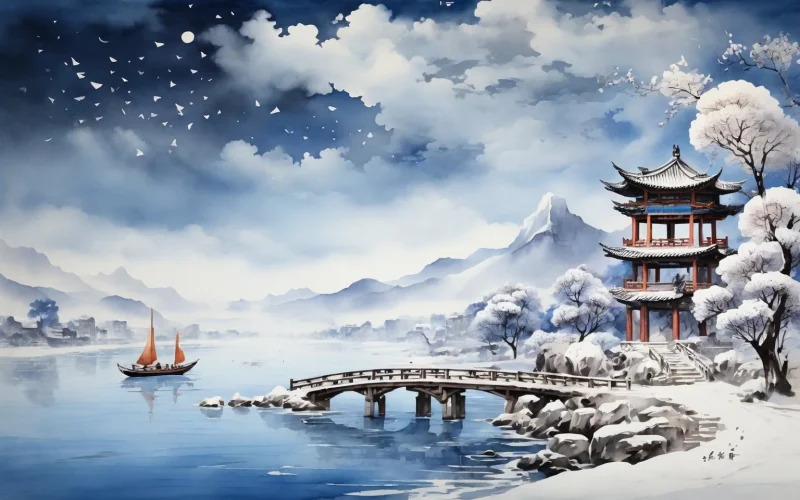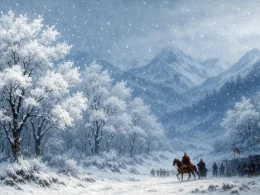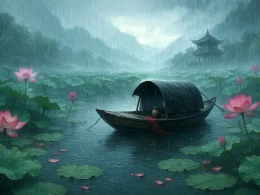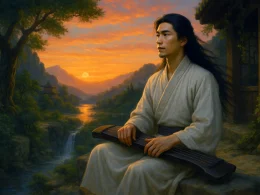The moon chills the desert sands,
Dust settles on fortress walls—
This year, the emperor’s grace descends anew.
Fresh Tartar melodies rise,
Through felt tents, generals’ songs resound.
Tiered towers stand proud:
Crimson coils round carved rails,
Jade eaves pierce emerald skies.
Ladies fair,
Their powdered fragrance drifting down
On the thin, frost-laced breeze.
Here should dwell a poet-immortal,
Astride white clouds with yellow cranes,
To roam with you in joy.
Long I gaze from the jade stairs—
Only endless mournful grass remains.
This taste of the world’s edge:
Wine to purge my sorrows,
Flowers to dissolve my might.
Beyond the western hills,
As dusk descends,
A scroll of silk unveils—
Autumn’s crystal clarity.
Original Poem
「翠楼吟 · 淳熙丙午冬」
月冷龙沙,尘清虎落,今年汉初赐。
新翻胡部曲,听毡幕元戎歌吹。
层楼高峙,看槛曲萦红,檐牙飞翠。
人姝丽,粉香吹下,夜寒风细。此地宜有词仙,拥素云黄鹤,与君游戏。
姜夔
玉梯凝望久,但芳草萋萋千里。
天涯情味,仗酒祓清愁,花消英气。
西山外,晚来还卷,一帘秋霁。
Interpretation
Composed in the winter of 1186 during Emperor Xiaozong's reign, this ci poem celebrates the inauguration of Anyuan Tower in Wuchang. At the time, Jiang Kui was traveling through the Jianghan region and joined friends to admire the newly constructed tower—a successor to the legendary Yellow Crane Tower, long a site for lofty contemplation. While depicting the structure's grandeur and celebratory banquets, the poet seamlessly transitions to historical reflection and personal lament, blending ethereal elegance with profound melancholy in a masterpiece of his later years.
First Stanza: "月冷龙沙,尘清虎落,今年汉初赐。新翻胡部曲,听毡幕元戎歌吹。层楼高峙,看槛曲萦红,檐牙飞翠。人姝丽,粉香吹下,夜寒风细。"
Yuè lěng lóng shā, chén qīng hǔ luò, jīnnián Hàn chū cì. Xīn fān hú bù qǔ, tīng zhān mù yuán róng gē chuī. Céng lóu gāo zhì, kàn kǎn qǔ yíng hóng, yán yá fēi cuì. Rén shū lì, fěn xiāng chuī xià, yè hán fēng xì.
Moon chills the desert sands,
Dust settles on frontier forts—
This year brings Han's renewed grace.
New Tartar melodies resound,
From felt tents, generals' music fills the space.
Tiered towers pierce the sky,
Vermilion rails twist like dragon veins,
Jade-green eaves soar in flight.
Radiant ladies descend,
Their powder fragrance drifting through
The fine, cold wind of night.
The stanza constructs a vibrant inaugural scene. "Moon chills the desert" (月冷龙沙) and "dust settles" (尘清虎落) establish a cleansed frontier backdrop, while "new Tartar melodies" (新翻胡部曲) inject exotic festivity. The tower's architectural splendor—"vermilion rails" (槛曲萦红) and "jade-green eaves" (檐牙飞翠)—frames the human pageantry, with "powder fragrance" (粉香) adding sensual elegance to the winter night.
Second Stanza: "此地宜有词仙,拥素云黄鹤,与君游戏。玉梯凝望久,但芳草萋萋千里。天涯情味,仗酒祓清愁,花消英气。西山外,晚来还卷,一帘秋霁。"
Cǐ dì yí yǒu cí xiān, yōng sù yún huáng hè, yǔ jūn yóu xì. Yù tī níng wàng jiǔ, dàn fāng cǎo qī qī qiān lǐ. Tiān yá qíng wèi, zhàng jiǔ fú qīng chóu, huā xiāo yīng qì. Xī shān wài, wǎn lái huán juǎn, yī lián qiū jì.
Here a verse-immortal should dwell,
Riding yellow crane through white clouds,
To roam with you in mirth.
Long I gaze from jade stairs:
Only endless fragrant grasses wave—
The very hue of earth.
Exile's flavor lingers,
Wine purges pure sorrow,
Fallen blooms blunt hero's zeal.
Beyond western hills,
Dusk rolls up its curtain,
Revealing autumn's crystal appeal.
The tone shifts to transcendence and lament. The "verse-immortal" (词仙) allusion to Cui Hao's Yellow Crane Tower poem bridges past and present, while "endless fragrant grasses" (芳草萋萋) symbolize both nature's permanence and human transience. "Wine purges sorrow" (仗酒祓清愁) and "fallen blooms" (花消英气) confess the poet's resigned melancholy, before the final vision—"autumn's crystal appeal" (秋霁)—offers cleansing clarity.
Holistic Appreciation
This lyric masterpiece transitions seamlessly from concrete depiction to ethereal musings, from magnificent scenes to profound emotions. The first stanza captures the grand completion of a tower - armored warriors and neighing steeds, the clamor of foreign music, towering pavilions and the powdered fragrance of singing courtesans - portraying a spectacular cross-cultural celebration. The poet opens with the solemn yet elegant imagery of a cold moon and desert sands ("龙沙"), immediately establishing depth. The inserted line "this year's imperial banquet bestowed" ("今年汉初赐") invokes the historical tradition of court feasts, adding temporal grandeur to the visual and auditory splendor.
The second stanza shifts from objective description to subjective reflection. The line "Here should dwell an immortal poet" ("宜有词仙") carries self-referential undertones, using the legend of the Yellow Crane Immortal to lament unrecognized talent. Phrases like "lush grasses stretching for miles" ("芳草萋萋千里") and "wine to dispel pure sorrow" ("仗酒祓清愁") reveal the wanderer's loneliness, while "flowers withering heroic spirit" ("花消英气") poignantly suggests thwarted ambitions. The concluding lines - "Beyond western hills, evening rolls up a curtain of autumn clarity" ("西山外,晚来还卷,一帘秋霁") - introduce serene tranquility, embodying the poet's ideal of "melancholy without despair."
Artistic Merits
- Rich yet natural allusions: The poem incorporates motifs from classical texts like "Yellow Crane Tower," "Rhapsody on Ascending the Tower," and "Ode to the White Parrot" seamlessly, enhancing its historical and cultural resonance.
- Majestic opening with fluid transitions: Beginning with vivid imagery, it progresses smoothly into lyrical reflection before returning to scenery, moving structurally from revelry to philosophical contemplation.
- Perfect fusion of scene and sentiment: The act of tower-ascent mirrors existential meditation, with melancholic tones conveying both personal lament and historical introspection.
- Exquisite diction with noble style: Phrases like "flying emerald" ("飞翠"), "fragrant breeze" ("香吹"), and "dispelling sorrow" ("祓清愁") demonstrate Jiang Kui's signature "ethereal clarity" (清空) aesthetic.
Insights
More than commemorating an architectural completion, this poem employs Anyuan Tower's grandeur and its festivities to express profound historical consciousness and personal lament. Amid revelry, the poet remains mindful of his era's trials; after feasting, he gazes alone toward horizons, transforming sorrow into verse. It exemplifies Song literati's ideal of "using poetry to express ideals," reminding us to balance celebration with reflection, and to elevate life's emotions into art that is both graceful and meaningful. The poem's enduring value lies in this perfect synthesis of personal emotion and historical consciousness, of momentary joy and eternal contemplation.
About the poet
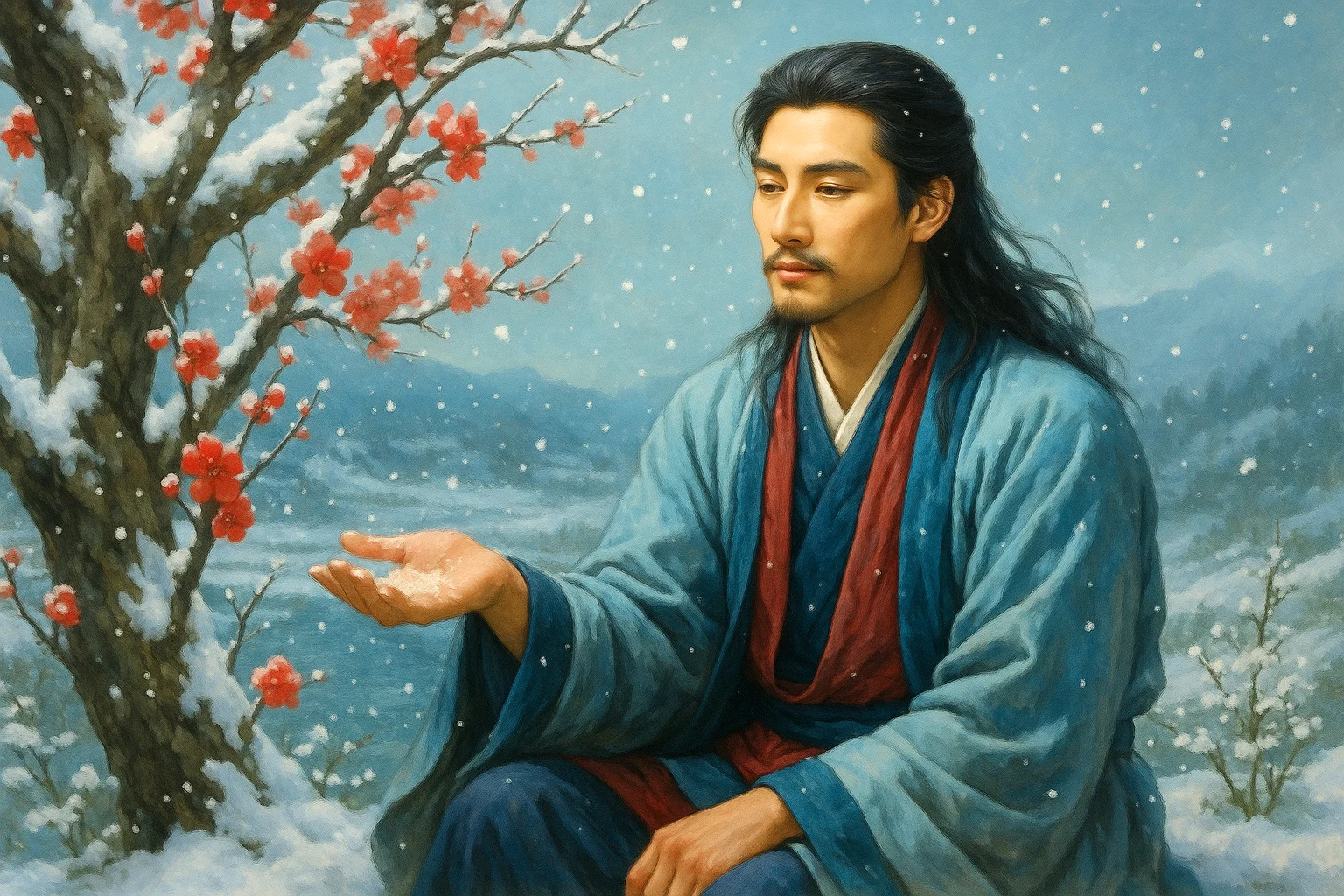
Jiang Kui (姜夔, c. 1155 - 1221), a native of Poyang, Jiangxi, was a Southern Song Dynasty lyric poet and musician. He remained a commoner throughout his life. His lyrics are known for their ethereal and austere style, and his poetry is also highly regarded. Along with Fan Chengda and Yang Wanli, he is celebrated as one of the "Four Great Masters of the Restoration."








